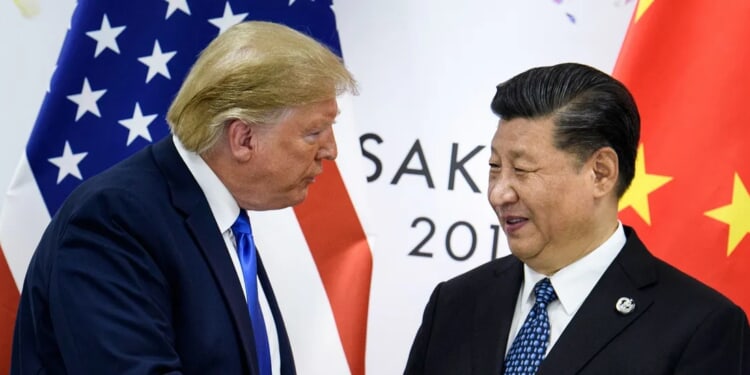China’s latest move should serve as a wake-up call.
As President Trump and Xi Jinping prepare for their first face-to-face meeting in nearly a year, China has just announced it will exercise greater control over rare earth supply chains, putting additional controls on some of the most important raw materials for manufacturing.
The United States has spent two decades acting as if the digital economy could float above the physical world, believing falsely that we could ignore our industrialized adversaries. Now, China’s chokehold on the resources we need most is exposing the hard-tech reality behind the digital dream. This moment should serve as a wakeup call for those who assumed America could be kept afloat by Silicon Valley – without ever asking where we were getting the silicon from. The downstream effects impact virtually every facet of American life, as well as the national security of the American future.
Leading up to a major summit between North American and Asian-Pacific countries, China’s Ministry of Commerce has announced it will begin requiring licenses for those wishing to export “…any products containing over 0.1% of domestically-sourced rare earths, or manufactured using China’s extraction, refining, magnet-making or recycling technology.” Permits will be automatically denied to those the Ministry deems threats, including those tied to foreign militaries, like that of the U.S., or placed on watch lists by the Chinese government. (RELATED: ‘Huge Stakes’: Mark Penn Explains Why US-China Trade Fight Could Be Tougher Than Ukraine War)
U.S. dependence on Chinese rare earth minerals is nothing short of profound. Magnets, semiconductors, wind turbines, batteries, defense technology, and AI infrastructure all depend critically on elements that are disproportionately sourced from, or processed within, China.
China alone controls over 90% of global processed rare earths and rare earth magnets, and while the conversation surrounding critical minerals has historically revolved around issues of renewable energy, the impact of these export controls is anything but restricted to green tech.
Semiconductors, data centers, batteries, and the AI boom all depend on physical inputs, most precariously on rare earths, and these industries now all lie in the balance of an increasingly adversarial foreign nation. These export controls will also ripple downstream, slowing manufacturing, raising costs on Americans, and threatening key strategic sectors at a critical moment for the U.S. economy.
For years, Silicon Valley and U.S. policymakers alike treated physical industry as a relic of the past, something that could be outsourced without consequence. In an effort to avoid protectionism, United States industrial policy globalized, basing its free-trade-at-all-costs strategy on the unlikely premise that its adversaries would be equally as open and its economy forever as digital.
But the digital revolution has always been built on top of mines, foundries, smelters, and factories, a reality that is beginning to come into focus all too late. A country who loses its supply chain to Beijing, also runs the risk of losing its sovereignty to Beijing. The AI boom, though described as “cloud-based” and “frictionless,” is in fact materially intensive: servers, chips, cooling, power, metals. While Americans might appreciate the conveniences of technology, their lives depend more on the physical world than their leaders have appreciated.
Pursuing a domestic industrial rare earths strategy is not impossible but will require intentional effort and considerable change of pace. The U.S. must embrace domestic extraction of the critical minerals we do have under our control, which includes more efficiently processing what we already mine.
Permitting reform and processing capability measures, too, require investment and attention in order to truly replicate the kinds of materials giving China leverage. Supply chain diversification and alliances from trusted allies like Australia, Canada, and Chile, will additionally be necessary counterweights to China’s near monopoly, particularly for the minerals not found in abundance domestically. Finally, none of this will be possible without abundant, reliable power, since industrial resurgence and all of the industries dependent upon it are enormously energy intensive.
For too long, America has loosened its grasp on strategic autonomy due to the false hope of a cloud-based future, and now our decisions are catching up to us. Congress has several proposals that could accelerate permitting and mineral processing, but they’ll require urgency, political courage, and bipartisan collaboration to pass. China’s recent change in posture over rare earths is the natural competitive response to our neglect of domestic industry, a pattern we must correct before it is too late. Our national security, AI competitiveness, and energy reliability depend on it.
Alina Voss is a fellow with ConservAmerica.
The views and opinions expressed in this commentary are those of the author and do not reflect the official position of the Daily Caller News Foundation.
All content created by the Daily Caller News Foundation, an independent and nonpartisan newswire service, is available without charge to any legitimate news publisher that can provide a large audience. All republished articles must include our logo, our reporter’s byline and their DCNF affiliation. For any questions about our guidelines or partnering with us, please contact licensing@dailycallernewsfoundation.org.










![Florida Officer Shot Twice in the Face During Service Call; Suspect Killed [WATCH]](https://www.right2024.com/wp-content/uploads/2025/12/Inmate-Escapes-Atlanta-Hospital-After-Suicide-Attempt-Steals-SUV-Handgun-350x250.jpg)






